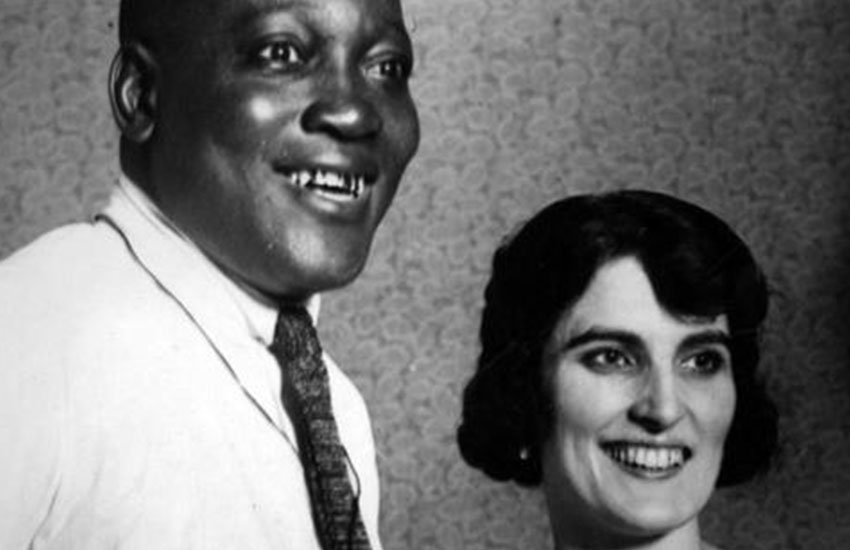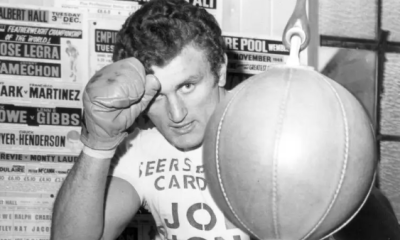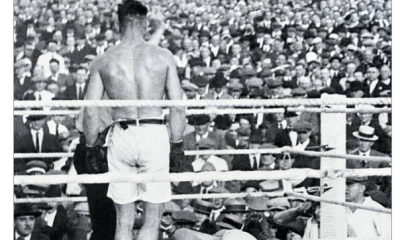Canada and USA
President Trump Pardons Jack Johnson but Gets No Brownie Points From Me
The campaign to secure a presidential pardon for Jack Johnson picked up steam in recent years. I knew the campaign would eventually bear fruit, and considering that posthumous

The campaign to secure a presidential pardon for Jack Johnson picked up steam in recent years. I knew the campaign would eventually bear fruit, and considering that posthumous pardons are so rare, the cynic in me figured that when it finally happened, the man in the Oval Office would be looking to win some brownie points from a community that he had largely alienated. In case you hadn’t noticed, prominent members of the African-American community are among the harshest critics of our commander-in-chief.
As for me, if I had been president, I would have said “no.” Yes, Jack Johnson, America’s first black heavyweight champion, was a victim of racism and an especially virulent strain of it. During the first decade of the 20th century, when Johnson came to the fore, lynching was at its zenith. Even respectable newspapers described African-American citizens in derogatory terms. Johnson’s nickname on fight posters was Galveston Giant, but white sportswriters were partial to “L’il Arthur” or the “Big Smoke.”
During Johnson’s heyday as a boxer, most of America’s cities harbored brothels in so-called red light districts. Indeed, for women under age 30 who worked outside the home, working in a brothel may have been the fifth most common occupation, trailing only secretary (Gal Friday in the vernacular of the day), sales clerk, seamstress, and schoolteacher. In western mining camps, brothel workers almost certainly topped the list.
Running a successful brothel required a steady stream of fresh faces. This created a cottage industry for procurers and pimps.
The Progressive Era brought a number of federal laws aimed at improving the moral fiber of the population. One of these laws was sponsored by an Illinois congressman named James Robert Mann. Passed in 1910, the law made it a felony to transport women across state lines for “immoral purposes.”
The law, historians have noted, was aimed primarily at foreigners, especially Chinese and Russian immigrants who were singled out by the scandal sheets as being heavily involved in the brothel industry. But one wouldn’t guess it from the name of it: The Mann Act was officially the White-Slave Traffic Act. The very name of it bespoke an insidious racism. (The law, by the way, is still on the books but has been amended to exclude consensual sexual acts.)
On Nov. 8, 1912, Jack Johnson was found guilty by an all-white federal jury in Chicago of violating this law. When the verdict was returned, federal judge Kenesaw Mountain Landis, best remembered as the iron-fisted commissioner of baseball, issued a bench warrant for Johnson’s arrest. Before the day was over, he was removed to jail in handcuffs.
It’s generally assumed that Johnson was singled out for prosecution because of his relationship with Lucille Cameron, a dark-haired 18-year-old runaway from Minneapolis (pictured) who found work as a cashier in Johnson’s Chicago nightclub. When Lucille’s mother claimed that Johnson had “hypnotic powers” over her daughter, the tabloids had a field day.
By most accounts, Johnson began cohabiting with Lucille Cameron within weeks, perhaps days, of the suicide of his second wife, Etta Duryea. Both women were white. While Johnson was free on bond, he married Lucille. She was then 19; he was 36 although for professional purposes he claimed to be two years younger.
Following the guilty verdict, Jack and Lucille fled the country. He was a fugitive for seven years before turning himself in to U.S. marshals at the Tijuana border crossing. Remanded to the federal penitentiary at Leavenworth, Kansas, he served 10 months before being paroled.
Now comes the $64.000 question: Was Jack Johnson guilty of the crime for which he was prosecuted?
The all-white jury may have been biased by Johnson’s infatuation with white women, in which case his conviction was a foregone conclusion, but the smoking gun wasn’t Lucille, but another woman, a white prostitute named Belle Schreiber. Johnson purportedly met her at the Everleigh Club, Chicago’s most opulent brothel. Schreiber testified that she accompanied Johnson on some of his travels during which they adopted the pose of husband and wife and that he rented and furnished an apartment for her in a building known to the Chicago police as a “disorderly house.” Moreover, she had documentation to prove it.
Ergo, the prosecution of Jack Johnson was congruent with the spirit of the law which was to clamp down on those involved in sex trafficking.
If Jack Johnson were alive today, the skin color of his lady friends would be largely a non-issue. But it’s a fair guess that he would make the news for domestic abuse, a hot-button topic largely ignored by reform groups in his day. He was a sporting man who attracted sporting ladies and his longer lasting affairs with the opposite sex were invariably tempestuous. His second wife Etta Duryea Johnson was purportedly hospitalized after one of their spats turned violent. (Now that Johnson has been pardoned, perhaps for the sake of symmetry the NFL should welcome former Baltimore Ravens running back Ray Rice back into the league, but that’s a story best tackled by someone writing for a different web site.)
Jack Johnson was in many ways an admirable figure; a man with brass balls who wouldn’t be bullied when it seemed like the whole world was against him. Aside from a few self-serving politicians, those that have carried his torch are good people guided by high ideals, but let’s not allow a presidential pardon to fudge his life story and scrub away his dark side.
Photo credit: Chicago Tribune archives
Check out more boxing news on video at The Boxing Channel
-

 Book Review4 weeks ago
Book Review4 weeks agoMark Kriegel’s New Book About Mike Tyson is a Must-Read
-

 Featured Articles3 weeks ago
Featured Articles3 weeks agoThe Hauser Report: Debunking Two Myths and Other Notes
-

 Featured Articles3 weeks ago
Featured Articles3 weeks agoMoses Itauma Continues his Rapid Rise; Steamrolls Dillian Whyte in Riyadh
-

 Featured Articles3 weeks ago
Featured Articles3 weeks agoNikita Tszyu and Australia’s Short-Lived Boxing Renaissance
-

 Featured Articles4 weeks ago
Featured Articles4 weeks agoKotari and Urakawa – Two Fatalities on the Same Card in Japan: Boxing’s Darkest Day
-

 Featured Articles3 weeks ago
Featured Articles3 weeks agoIs Moses Itauma the Next Mike Tyson?
-

 Featured Articles2 weeks ago
Featured Articles2 weeks agoBoxing Odds and Ends: Paul vs ‘Tank,’ Big Trouble for Marselles Brown and More
-

 Featured Articles3 weeks ago
Featured Articles3 weeks agoAvila Perspective, Chap. 340: MVP in Orlando This Weekend




















